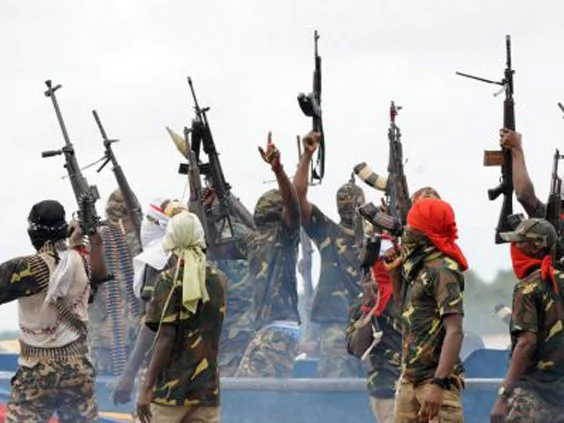According to the report, the president promised to eliminate the terror group, still classed as one of the world’s most deadly. It said that despite the administration’s claims the Islamic militants have continued to wreak havoc in the northeastern states of the country.
Tisdall reports indicate that Buhari’s military style crack-them-down approach to governance has resulted proliferation of militancy and agitations across the country, especially in the Southeast and Southeast.
The full article below:
Buhari’s crackdown in Nigeria fails to stamp out Boko Haram

Time is up for Muhammadu Buhari, Nigeria’s president and former army general, who promised before his inauguration on 29 May last year to stamp out Boko Haram within 12 months – and has singularly failed to do so, despite a tough military crackdown in the country’s north-east.
While the terrorist group, blamed for 20,000 deaths over the past seven years, has taken a beating, it is down but not out. Analysts warn, meanwhile, that Buhari’s harsh approach to unrest of any kind may be causing more problems than it solves across Nigeria as a whole.
At a summit in Abuja earlier this month, Buhari appeared to admit the difficulty of fulfilling the task he set himself. The meeting included representatives from Benin, Cameroon, Chad and Niger. France, the US, Britain and the EU, who back the anti-Boko Haram campaign, also attended.
Despite increased support from London and Washington, which have each sent about 300 troops to the region in a training and advisory capacity, Buhari’s aim was yet closer military cooperation via an expanded international effort.
“I believe Buhari is acknowledging … that it is not easy for the military to just go out there and eliminate Boko Haram,” Martin Ewi of the Institute for Security Studies told al-Jazeera. “The rural areas have always been neglected when it comes to security and that has always been the problem – the ungoverned places.”
Nigerian army offensives have won back territory from Boko Haram in the past year, and the number and frequency of terrorist attacks has fallen significantly.
Last year’s dramatic announcement by Boko Haram’s leader, Abubakar Shekau, that he was entering into an alliance with Islamic State appears to have been a propaganda stunt amounting to little in practical terms.
Yet when one of the 276 Chibok schoolgirl hostages abducted in 2014, Amina Ali Darsha Nkeki, was rescued earlier this month, Buhari made great play of it, having her flown to meet him in Abuja. The fuss looked like a slightly desperate bid to deflect attention from the fact the other girls remain unaccounted for.
Also contradicting the official “winning” narrative is evidence that faced by more determined military pressure, Boko Haram is resorting to wider use of suicide bombings, carried out by women and children, and increased attrition, including more hostage-taking.
According to the 2015 Global Terrorism Index, a survey by the New York-based Institute for Economics and Peace, Boko Haram remains the most deadly terrorist group in the world.
And there are growing fears that, evolving in parallel to the internationalisation of the counter-terrorism campaign, a once localised hardline Islamist movement is morphing into a regional jihadist threat.
The disastrous economic and social legacy of Boko Haram’s depredations, and a linked, ongoing humanitarian crisis in the Lake Chad basin, has brought calls for Buhari to adopt a more constructive approach extending beyond crude military suppression tactics.
Amnesty International claimed recently that the Nigerian army, notorious for past human rights abuses, had killed 350 Muslim civilians in northern Kaduna state and secretly buried them in a mass grave.
In a statement linked to the Abuja summit, the UN security council urged regional states to pursue “a comprehensive strategy to address the governance, security, development, socio-economic and humanitarian dimensions of the crisis”.
The independent Brussels-based International Crisis Group said Boko Haram was “seemingly on a back foot, but it is unlikely to be eliminated in a decisive battle”. Regional powers should “move beyond military cooperation and design a more holistic local and regional response”.
In particular, the ICG said, Nigeria and its allies should more effectively collate and exploit information gathered from captured fighters, abductees, defectors and civilians in newly recaptured areas.
Nnamdi Obasi, the ICG’s senior analyst for Nigeria, warned that Buhari’s tough approach was having a negative knock-on effect in other Nigerian trouble spots. He pointed in particular to the south-east, where Igbo secessionist groups are demanding the restoration of the ill-fated republic of Biafra.
Nigeria’s Middle Belt has seen increasing levels of violence between local communities, while the 2009 peace deal that ended the insurgency in the oil-rich Niger Delta is unravelling, Obasi said. Up-and-coming militant groups included the so-called Niger Delta Avengers and the Egbesu Mightier Fraternity.
Peaceful manifestations of unrest had been met with harsh measures, including arbitrary arrests.
“Both groups have sent the government their lists of demands, mostly for local control of oil revenues, threatening even more crippling attacks if they are ignored. The government’s response – deploying more military assets and threatening an unmitigated crackdown – portends an escalation of the violence,” Obasi said.
Insecurity and social tension is being aggravated across Nigeria by its deteriorating economic situation, a 70% year-on-year devaluation of the national currency, the naira, fuel and power shortages, rising unemployment and continuing problems with endemic corruption, the ICG said.














